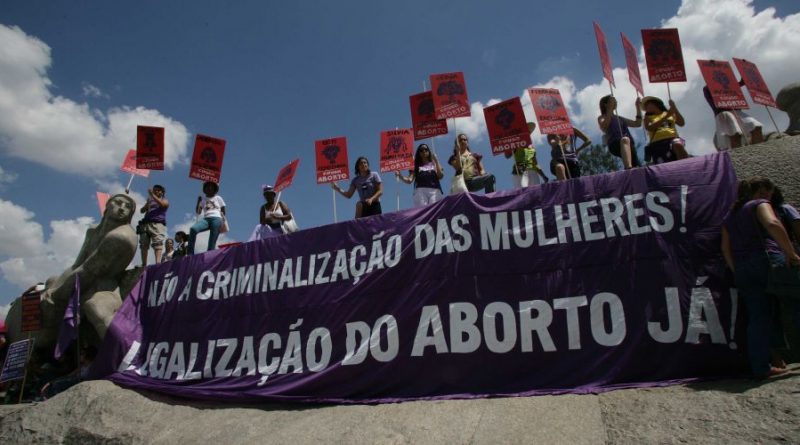10 Things to Read About Abortion in Brazil
Since 1940, abortion has been illegal in Brazil, except in cases of rape or when the woman’s life is at risk. Even when there is a severe foetal malformation as in anencephaly, abortion is only permitted after judicial authorization. Despite legislative efforts to liberalize the law, especially from feminist organizations, the current law has not changed significantly since becoming a statute and the magnitude of clandestine abortions has increased. Women’s access to legal abortion services can be made difficult for several reasons: the conscientious objection of health care professionals, the demands of a sterile bureaucracy as police documents or judicial authorization, stigmatization, poverty, lack of knowledge, and barriers in accessing contraceptive methods.
The following list of articles can be helpful to understand, first of all, the historical background of abortion in Brazil, the present legislation, as well as several factors around abortion’s context (such as diseases, vulnerability, illegal abortion, physicians’ opinions, conscientious or religious objections). It is also useful to keep an eye on the future with respect to the possibility of change and improvement of this complex reality.
1 – Brazil: one of the abortion front lines
To understand the meaning and complexity of abortion in Brazil it might help have an overall vision of the issue. In this article, the author Sonia Correa made a historical excursus about the abortion debate, re-visiting several factors such as political controversies, the Catholic Church, human rights organizations, moral and ethical questions, feminist movements, as well as public opinion untill 2010.
2 – Brazil: Reject Abortion Ban. Constitutional Amendment Would Endanger Women, Girls; Violate Rights
Once understood the context of abortion in Brazil, it is important to know the current situation in the field of legislation. In November 2017, a special congressional committee of Brazil’s Chamber of Deputies approved an abortion ban with 18 men voting yes and 1 woman voting no. After that, the committee voted on the final text of the proposed amendment on December 12 in order to send it to the full Chamber of Deputies. In order to become law and amend the Constitution, the legislation would need a super majority in both houses of Congress, and the president’s signature. The new amendment would prohibit abortion under any circumstances: if it passes, women who do not wish to continue their pregnancies because it threatens their health or because they resulted from rape or even because of disease like Zika virus or HIV, will be forced to continue those pregnancies.
Speaking of disease, this Human Rights Watch article explaines the risk of Zika infection during pregnancy and the consequences of an increasing number of women seeking un-safe and clandestine abortions. The Brazilian public health system does not provide the information and support they need to protect themselves from the virus (in terms of prevention, analysis, or care). Currently, ensuring reproductive autonomy through access to a full range of reproductive choices is a missing piece of the public health response to Zika. So, anxiety and uncertainty around the Zika virus outbreak may have increased illegal abortion in Brazil. Also, women who have received an early diagnosis of foetal complications have often discontinued pre-natal care and sought abortions outside the health system.
4 – Exploring the relationship between induced abortion and HIV infection in Brazil
This qualitative study investigates on how HIV infections may influence women’s decisions about pregnancy termination. As with Zika virus, in Brazil there is a lack of information about preventing HIV and also obstacles to preventing unwanted pregnancies among WLHIV (Women Living with HIV). Such obstacles include lack of family planning services tailored to their needs and limited access to contraceptive methods. Furthermore, Brazil’s restrictive laws regarding induced abortion does not exempt women with HIV. When facing an unplanned pregnancy, WLHIV may decide to terminate it because of the difficulties in accessing health services and, mainly, due to fears about transmitting HIV to their children, or not being able to breastfeed or even not being capable to care for them due to the disease.
5 – Abortion and sex-related conditions in substance-dependent Brazilian patients
Complications from abortion are among the major causes of maternal mortality, which seems to be repeatedly true for the most vulnerable population, such as the chronic drug users. This article aims to evaluate the prevalence of induced abortion and sex-related conditions in an inpatient drug user sample. Drug- and alcohol-dependent patients have high-risk behaviours of sporadic use or no-condom use which contribute to unplanned pregnancy and induced abortion, making this vulnerable population a group which deserves special attention in sexual health prevention programmes and health promotion efforts for the reduction of induced abortion.
6 – The biomedicalisation of illegal abortion: the double life of misoprostol in Brazil
The use of misoprostol for self-induced abortion it expanded greatly once it became clear that it reduced abortion-related complications. Introduced for treating gastric ulcers, misoprostol soon became available over the counter. In 1991, the government restricted the medicine’s availability, after which abortion-related mortality increased, but the drug remained widely available in the black market. This paper studies the extent to which misoprostol’s use is spread in countries with restrictive abortion laws and deep social inequalities, like Brazil. The lack of legal access to misoprostol and to information on its safe use makes its use dangerous for low-income women. In fact, low-income women often use misoprostol along with other, unsafe abortifacients and when they seek medical care they are often stigmatised and discriminated against by physicians and other health professionals with conservative attitudes to abortion.
Currently, poor knowledge on the requirements to carry out an abortion within the law may be a main factor responsible for the lack of access to legal abortion in Brazil. In fact, physicians’ inappropriate knowledge of the law may be playing a role in this situation of unsafe abortion. The purpose of this article is evaluate which factors are associated with the level of information and the opinion of the Brazilian gynaecologists-obstetricians concerning abortion laws. According to this study, most of physicians have a good knowledge of the situations in which abortion is allowed but not about the documents required to carry out a legal abortion.
8 – Conscientious objection and abortion: rights and duties of public sector physicians
This article discusses conscientious objection by physicians, through the concrete situation of legal abortion services. Conscientious objection is a formal mechanism for professional codes and public policies to protect the integrity of people involved in a situation of moral conflict, as in the case of the physician who declares conscientious objection to refuse care to a woman that wants a legal abortion. In this case, the physician can conscientiously object to a request for abortion, as long as it is not done in disbelief of the rape, for example. In alleging conscientious objection, the doctor solicits permission to not fulfil their obligation. The woman is attended by another physician or referred to another service, but there is the risk that she can be left without assistance. This paper discusses the possibility to protect the physician’s moral integrity but also limited obstructionism and violations of the woman’s right to legal abortion.
9 – Religion and Attitudes Toward Abortion and Abortion Policy in Brazil
One of the reasons why a physician may decide to object abortion is religious beliefs. The purpose of this article is to examine the association between religion and attitudes toward the practice of abortion and abortion policy in Brazil. In fact, grasping an understanding of the religious factors underpinning abortion issues in Brazil may lead to greater insight about how the policy preferences of religious voting constituencies will shape public policies in the future of this country. The study suggests that the political salience of religious beliefs, evidenced by the expanding influence of religious politicians in the political sphere, will likely lead to more political opposition to abortion policy and also with respect to other social issues that are dissonant with conservative ideologies.
10 – Making Legal Abortion Accessible in Brazil
This final article describes several factors that might make the legalization of abortion in Brazil possible. The support of medical professionals, the organizations and strength of women’s health and rights movement, the political support at federal, state and city government levels, a favourable international environment, better knowledge about the law and services, prevention, sexual education, and ongoing advocacy within the medical establishment can then be important elements to make legal abortion available.
Pro-choice feminists protesting in São Paulo on the International Women's Day / Photo by Christiensen / public domain
![]() This work is licensed under a Creative Commons Attribution-NonCommercial-ShareAlike 4.0 International License.
This work is licensed under a Creative Commons Attribution-NonCommercial-ShareAlike 4.0 International License.




